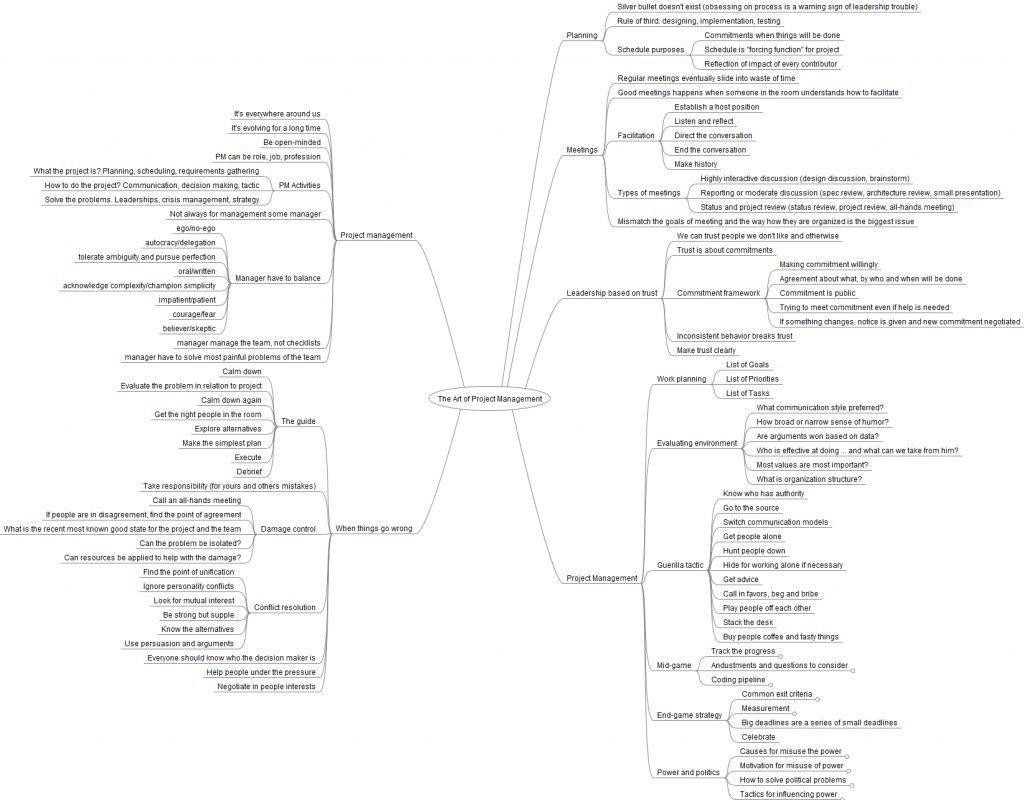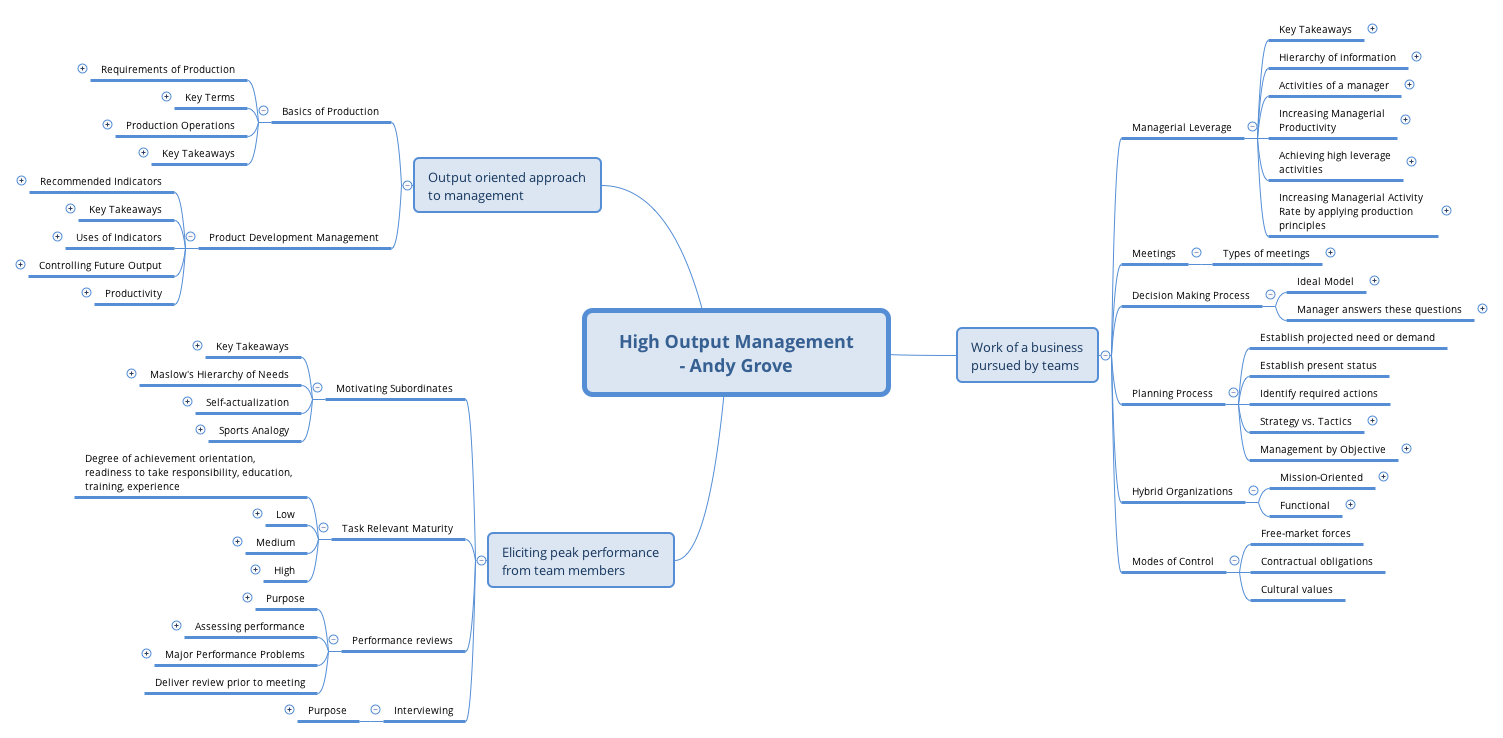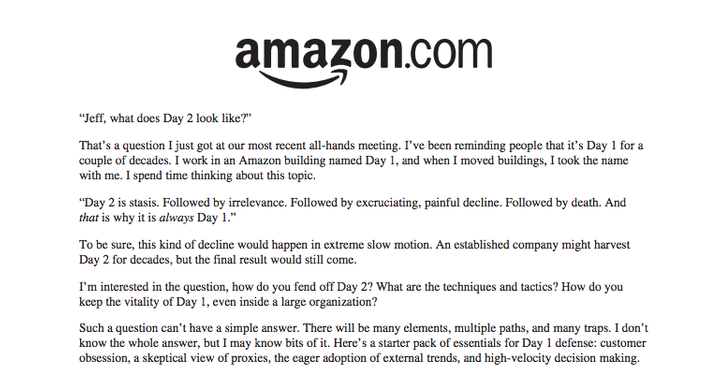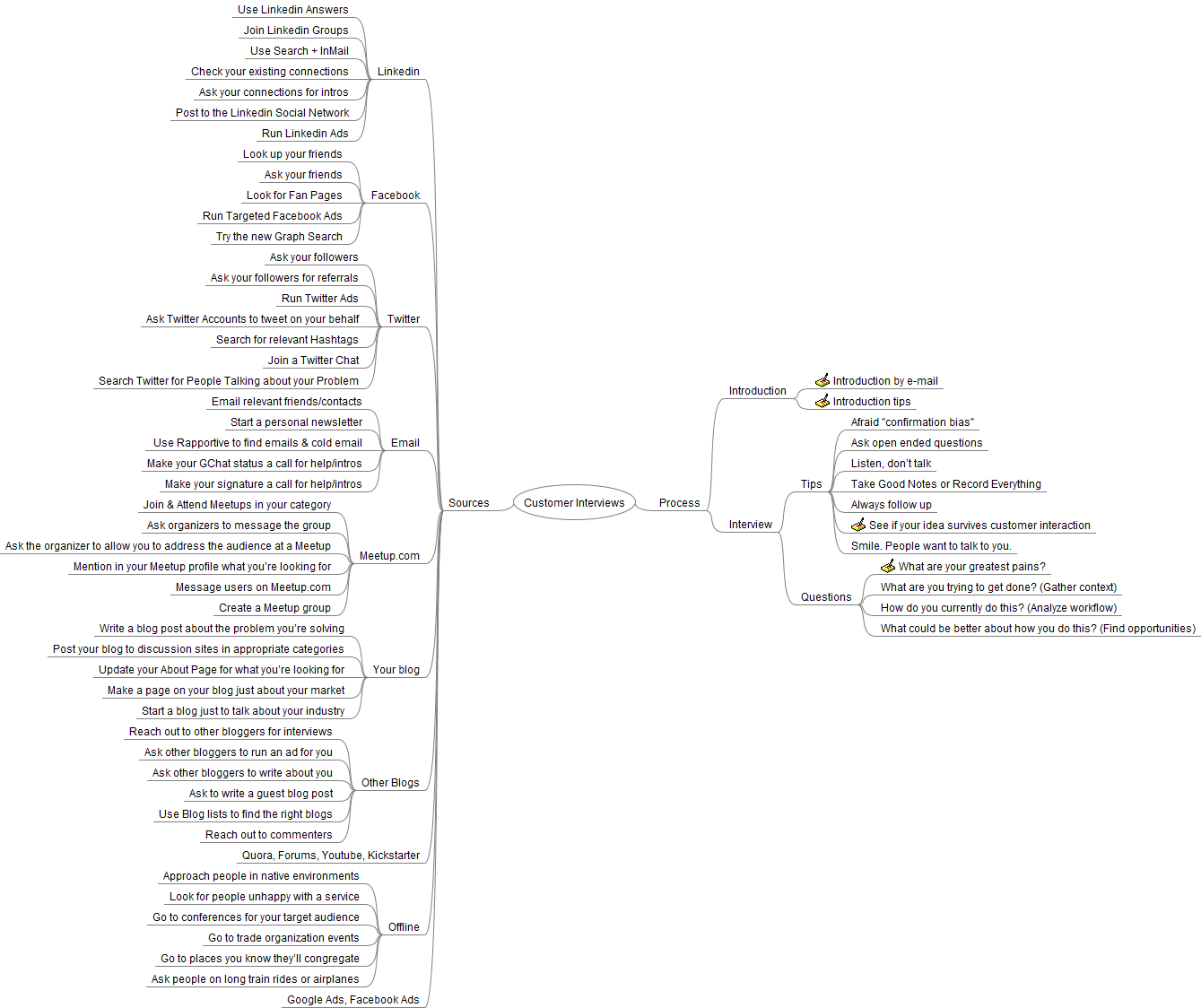Have finished reading The Art of Project Management by Scott Berkun. Fundamental, comprehensive work covers many aspects of managing projects, people, time. The book itself is an excellent tool that can be used by me for building the process and solving problems.
Below is mindmap of the book. Hope will help you the same as me.

- Project management
- It’s everywhere around us
- It’s evolving for a long time
- Be open-minded
- PM can be role, job, profession
- PM Activities
- What the project is? Planning, scheduling, requirements gathering
- How to do the project? Communication, decision making, tactic
- Solve the problems. Leaderships, crisis management, strategy
- Not always for management some manager
- Manager have to balance
- ego/no-ego
- autocracy/delegation
- tolerate ambiguity and pursue perfection
- oral/written
- acknowledge complexity/champion simplicity
- impatient/patient
- courage/fear
- believer/skeptic
- manager manage the team, not checklists
- manager have to solve most painful problems of the team
- When things go wrong
- The guide
- Calm down
- Evaluate the problem in relation to project
- Calm down again
- Get the right people in the room
- Explore alternatives
- Make the simplest plan
- Execute
- Debrief
- Take responsibility (for yours and others mistakes)
- Damage control
- Call an all-hands meeting
- If people are in disagreement, find the point of agreement
- What is the recent most known good state for the project and the team
- Can the problem be isolated?
- Can resources be applied to help with the damage?
- Conflict resolution
- Find the point of unification
- Ignore personality conflicts
- Look for mutual interest
- Be strong but supple
- Know the alternatives
- Use persuasion and arguments
- Everyone should know who the decision maker is
- Help people under the pressure
- Negotiate in people interests
- The guide
- Planning
- Silver bullet doesn’t exist (obsessing on process is a warning sign of leadership trouble)
- Rule of third: designing, implementation, testing
- Schedule purposes
- Commitments when things will be done
- Schedule is “forcing function” for project
- Reflection of impact of every contributor
- Meetings
- Regular meetings eventually slide into waste of time
- Good meetings happens when someone in the room understands how to facilitate
- Facilitation
- Establish a host position
- Listen and reflect
- Direct the conversation
- End the conversation
- Make history
- Types of meetings
- Highly interactive discussion (design discussion, brainstorm)
- Reporting or moderate discussion (spec review, architecture review, small presentation)
- Status and project review (status review, project review, all-hands meeting)
- Mismatch the goals of meeting and the way how they are organized is the biggest issue
- Leadership based on trust
- We can trust people we don’t like and otherwise
- Trust is about commitments
- Commitment framework
- Making commitment willingly
- Agreement about what, by who and when will be done
- Commitment is public
- Trying to meet commitment even if help is needed
- If something changes, notice is given and new commitment negotiated
- Inconsistent behavior breaks trust
- Make trust clearly
- Project Management
- Work planning
- List of Goals
- List of Priorities
- List of Tasks
- Evaluating environment
- What communication style preferred?
- How broad or narrow sense of humor?
- Are arguments won based on data?
- Who is effective at doing … and what can we take from him?
- Most values are most important?
- What is organization structure?
- Guerilla tactic
- Know who has authority
- Go to the source
- Switch communication models
- Get people alone
- Hunt people down
- Hide for working alone if necessary
- Get advice
- Call in favors, beg and bribe
- Play people off each other
- Stack the desk
- Buy people coffee and tasty things
- Mid-game
- Track the progress
- What is the probability to hit next/date/milestone?
- What adjustments needed to improve probability?
- What are the biggest risks?
- Track changes of the project goal
- Andustments and questions to consider
- What problem are we trying to solve?
- Can we live with it?
- Are costs worth of working the issue out?
- Are risks of potential problem worth to be changed?
- Is is symptom or cause?
- Do we have enough understanding to predict the state of the code?
- Coding pipeline
- Docs have to be prepared ahead of the coding work
- Are there any issues blocking active work items?
- Are priorities strictly defined?
- Was the last work item really completed?
- Track the progress
- End-game strategy
- Common exit criteria
- Spec/design/tasks completed
- Bug counts at certain levels
- Passing specified test cases
- Performance/reliability metrics
- Time/money
- Measurement
- Daily builds stability
- Bugs management
- Fix rate
- Incoming to approved
- Active bug time
- Bugs per developer
- Fault feedback ratio
- Big deadlines are a series of small deadlines
- Celebrate
- Common exit criteria
- Power and politics
- Causes for misuse the power
- Unclear decision making
- Misunderstanding/miscommunication
- Unclear resource allocation
- Lack of accountability and responsibility
- Weak or toothless goals
- Motivation for misuse of power
- Protecting others
- Self-interests
- Ego
- Dislike/revenge
- How to solve political problems
- Clarify what you need
- Resources
- Authority to make decision
- Influence on decision under someone else authority
- Adjust of others goals to support or alight with yours
- Adjustment of your goals to betted align with others
- Advice, expertise, support
- Understand who can give you the power
- Understand goals of people who has power
- Clarify what you need
- Tactics for influencing power
- Direct
- Conversation
- The use of influence
- Indirect use of influence
- The group meeting
- Causes for misuse the power
- Work planning




